- Home
- Annie Proulx
Bad Dirt Page 19
Bad Dirt Read online
Page 19
“We just don’t have the money,” her mother said. “Bring down your old blue dress and I’ll sew some lace on the hem after I get the dishes done. But I wish just as much as you that you had two or three pretty new dresses.”
She had brought down the blue dress, hating its childish puffed sleeves, its faded color. Miraculously, in the morning the blue dress had disappeared and in its place there had been not one but three new dresses. She remembered them vividly. One was a silky rayon, very thin pink and white stripes. It had an unusual pleated bodice and a square neckline set off by two tiny bows. Young as she was she had recognized that it had style. Another was a dark blue wool with a white piqué Peter Pan collar, a very grown-up kind of dress. The third was the one she wore most often, a cranberry red corduroy jumper with two turtleneck knit shirts, one aquamarine and one snow white.
She took the secretarial course in high school and left home when she was nineteen, the week after graduation, with the promise of a job in a lawyer’s office in Cheyenne. It was 1955, she had a new purse with a hundred dollars in it. Her mother had pressed it into her hand, saying, “Take this.” How she had come by such a sum Christina could not imagine. The home place still did not have electricity.
In Cheyenne she rented a dingy, cold room in a boardinghouse. The work of the lawyer’s office was fussy and carried a good deal of responsibility. The lawyer often praised her thoroughness and dependability. She might have spent the rest of her life there, scrimping along, going home on weekends, living a small life, but she made a friend, Rose Clover, who also lived at the boardinghouse and had her own business, the Ladyfinger Bakery. In those days Christina had masses of red-gold hair, which she wore in a chignon, hair that slid and bunched in Rose’s hands. Rose had a good head for figures and a sense of adventure. Their first bond was a mutual hatred of their older brothers. Rose had suffered more than Christina, for her brother Clay, eight years older than she, had sexually assaulted her from the time she was five until she left home.
They lived for the weekends, when they went to the movies— which Rose called “the show”—and then ate a magnificent dinner at Duke’s Hotel. Twice they rented bicycles and pedaled out on the prairie roads with a picnic. Rose talked about getting a car, but even an old jalopy would cost several hundred dollars and gas was twenty-nine cents a gallon so it seemed a terrible expense. Neither of them liked men, and they agreed that Cheyenne, polluted by Warren Air Force Base, was an awful place.
Christina wore the fashionable long tube skirts of the “new look” and ballet slippers, but Rose, who spent her time in the bakery, dressed in blue jeans and T-shirts that were always dusty with flour.
One Saturday they took the bus to Fort Collins in Colorado to see a foreign film at the university, Fellini’sNights of Cabiria, and as they were leaving the theater in a crowd of students, Rose said, “I want to go somewhere, I want to see other places in the world. Let’s go on a vacation. You ever been on a vacation?”
“No. Where would we go?”
“Seattle,” said Rose, who had been reading a magazine. “Or Los Angeles. Somewhere in California. See the ocean, movie stars, palm trees? We deserve a vacation. Other people go on trips, why shouldn’t we? Maybe we’ll go to Italy.”
Weeks of discussion followed before they decided to visit both San Francisco and Los Angeles. Since they had no car nor could either drive, they would take trains and buses where possible and walk once they reached their destinations. Their first stop was Los Angeles.
Los Angeles was too much. There were palm trees, but most of what they saw reminded them of Cheyenne multiplied by a large factor. After forty-eight hours of endless walking in all directions from the cheap but noisy Hotel of the Angels, they caught the bus for San Francisco.
“No palm trees,” said Rose, “but look at those jazzy houses. What you can see, anyway,” she added because the fog was coming in.
It was the first vacation of Christina’s life, the first large city she had ever explored, the Pacific the first ocean she’d seen. They had had a wonderful time taking in the sights, riding on the ferries, crossing the Golden Gate Bridge, for which Rose felt a special affection as it had been finished the year she was born, eating in wonderful restaurants, sharing a bed with a sagging mattress that rolled them together in the middle.
“I wish we didn’t have to go back,” Christina whispered to Rose on their last night. Rose’s auburn curls whisked as she turned her head.
“We don’t. There’s jobs all over the place here. I bet you we could go out tomorrow morning and find jobs in about ten minutes. The hard part would be finding a place to live. You want a give it a try?”
“Yes,” said Christina, stepping off the diving board, allured by the thought of being on vacation for the rest of her life, of being with Rose, of sharing a place no matter how small. Rose gave her a hug and whispered, “It’ll be really, really swell. And we’ll have a chance to get out of the old Wyo rut. I don’t want to be a baker. I don’t want a marry some awful mean rancher and have to bring a covered dish to the Cow Belles meetings. I want to go to college. I want my own money and my own life—and you.”
The years had slipped along like a needle passing through muslin. Rose wanted education and went to the university, then to graduate school and earned a degree in urban planning. Christina started in a department store and worked her way up to principal buyer for one of the better women’s shops. She bought a car and learned to drive. Every year they enjoyed two vacations, visited Mexico City, Machu Picchu, Venice, Hawaii, Sweden. Most of their trips focused on cities that Rose was eager to see. In Sydney they examined the elegant waterfront flats converted from old warehouses, they had visited Montreal for the thirtieth anniversary of Moshe Safdie’s Habitat. In London, Rose deplored the city’s contemporary reputation for cowboy construction, which seemed particularly brash in the company of Georgian and Palladian architectural masterpieces. Even Denver had something of interest as the old stockyards, livery stables, creameries, saddlemakers’ shops, trolley barns, flophouses, and western shirt factories turned into expensive lofts.
Both of them had retired a few years ago and now traveled the country in a Hop Toad motor home, its rear decorated with a toad decal, curved lines indicating completion of the creature’s robust leap.
“That’s us,” Rose had said pulling into a Canyon de Chelly parking lot. “Just hopping around.” They bought each other bead necklaces from an Indian vendor whose wares were spread on a low rock wall above the deep canyon. Rose caught her breath at the houses high in the cliff and Christina tried to imagine climbing up and down sheer rock faces to get home. The cliff dwellers must have been the most agile of human beings. And now here she was where she had started, in a smelly little house stuffing old paper sacks into a trash bag. She hoped they could finish up everything in one day. She looked forward to the motel room and her vodka and orange juice. She would call Rose.
“But right now,” she said, “I’m going to make a cup of coffee. Anybody for a nice hot cup of instant?” She had had the foresight to bring a jar with her. Both Patsy and Wendy shook their heads. Patsy was drinking a Coke, and Wendy, who was a vegetarian, preferred herbal teas.
She filled the heavy kettle at the sink, flushing out an alarmed spider. She was halfway to the range when the spattering of water caught her attention. A stream of drops fell from the kettle. She held it up and looked at it. There was a tiny hole in the bottom.
“Well for God’s sake,” she said. “I guess there will not be any instant after all. My great inherited teakettle has a hole. I sure wish they had invested in a microwave, but no such luck.” She put the kettle in the sink and let it drain out of the damaged bottom.
“Aunt Christina?” called Wendy. “What’s this?” Christina stuck her head into the pantry, where her two nieces were still struggling with the paper bags. Wendy was pointing to a box on the top shelf:ELECTRO -WORLD MICROWAVE OVEN.
“I can’t believe it! Just imagine, sh
e never even opened it. Probably been sitting there for years.” She reached up and grasped the box, careful not to bring it down too quickly as it was undoubtedly covered in dust and would start a storm of sneezes. But there was no dust on the box, which looked very new. She quickly plugged the oven in and heated her water.
“Good. Now we can have hot soup later on.”
Wendy was looking at the microwave. “You know,” she said, “this is a really new brand. I was looking at these in Wal-Mart the other day. They’re pretty new.”
“It’s a mystery,” Christina agreed.
His parents’ poverty puzzled Bobcat. The old man had had a good head for figures and a taste for mathematical problems. He had often set nasty puzzles for his children, forcing them to figure the capacity of silos, the cost per hour of operating a six-plow tractor, estimating the number of tons of hay in a given stack, finding the capacity of a watering trough, the number of nails in a pound, how many steers could fit in a boxcar. Christina, of course, the brat, had kept trying to solve the impossible calculations made more difficult by the addition of their father’s extraneous and incalculable factors, such as heavy rain and deep mud, a hole in the wagon box, and variations on nail sizes from threepenny fine to tenpenny fence nails. Bobcat realized there were no solutions to the problems, that they were a kind of parental torture. And, despite his father’s mathematical flair, there was never any money in the house. What had made both parents so parsimonious, so cheese paring? He supposed it was the Depression and being forced to abandon ranching for teaching shop. It occurred to him that perhaps his father had hated shop as much as the son. The big puzzle was what they had lived on for the past thirty years. Did his father have some kind of eternal teacher’s pension? Did social security keep them going? Had they somehow inherited money that no one knew about? And where had his mother found the money to help him with his business starts year after year? Bobcat had never repaid a cent, and he was now intensely curious about the source of his mother’s money. It was possible they had some kind of secret stash. Maybe the old man had found a valuable fossil, or his mother had won the Publisher’s Sweepstakes.
“I’m going to wash these doodads,” said Wendy, carrying a box of china ornaments collected around the house. “They are all pretty dusty.” At the sink she sighed.
“Aunt Christina, what do you want to do with this old kettle in the sink?”
“Give it here, I’ll take it out to the boys and they can take it back to the dump from whence it came.” She looked out the window to the driveway, where Max’s ancient truck sat. There was a tremendous pile of junk nearby, waiting to go into the bed. Jacky was trying once again to start the truck before they filled it. It made a dispirited whine and nothing more.
“You’ll run the battery down,” shouted Bobcat from the garage interior.
“Grandpa, it’s a brand-new battery we brought with us. That ain’t the problem.”
“Oh, I wish they’d get it started so we could clear up this mess and get out of here,” said Christina, holding the kettle away from her. At that moment the engine roared into life, billows of blue smoke bursting from the tailpipe along with a mouse’s nest.
Christina caught her breath. “That was just alittle too convenient,” she said. “That’s like the microwave. There’s something funny going on here.” Still holding the kettle, she said loudly, “I sure wish that when I looked in the refrigerator I’d find a nice vodka–orange juice. With ice.” She put the kettle on the range and went to the refrigerator—her mother had always called it “the icebox”—opened the door and saw a tall cut-crystal glass sparkling with ice cubes, brimming with orange juice. There was a fresh and fragrant orange blossom perched on the frosted rim. She tasted the drink, drained the glass, closed the refrigerator door, and still holding the kettle, went out to the garage.
“Bobcat,” she called.
“What? I’m busy, so make it short.” He spoke to her as he always had, sharply and with annoyance.
“Oh, nothing. I won’t bother you.” She carried the kettle out into the driveway near the truck and said to Jacky and Ringold, “I sure wish that truck would keep running like a champion for years and years.”
“You and me both,” said Jacky. “Do you think we could have the truck? I mean, unless Grandma Stifle left it to somebody else?”
“I bet she would have wanted you boys to have it. But you live in different cities. How would you share it?”
Ringold said, “There’s another vehicle—car or truck, I don’t know what—out in the barn. Whatever it is I could have that. If it’s not a total wreck.”
“I didn’t see anything,” said Jacky. “What is it?”
“Got me. It’s under a big dirty tarp. I just lifted up one corner and saw two rear flat tires.”
Jacky immediately went to the barn, and Christina went back in the house, still carrying the teakettle.
Ten minutes later Jacky came back.
“So what was it?”
“Dude. Brace yourself. It’s a ’43 Willys Jeep. In good condition. And it’s still got the rotating headlight and the side straps.”
“No shit!”
“What it is.” They both went to the barn and Bobcat heard ecstatic cries for some time, until he went there himself.
“I remember that Jeep,” he said. “I was with Dad when he bought it after the war. War surplus. Cost him a hundred and fifty dollars. He drove it for years. Most uncomfortable vehicle ever made.”
“Who cares about comfort,” said Jacky. “This’s a great vehicle, a collector’s item.”
“Collector’s item?” said Bobcat, smelling money. “Valuable?”
Ringold sensed his prize could disappear. “More cool than valuable,” he lied. “Probably not worth that much in dollars, but in coolness it ranks.”
“They’re dangerous,” said Bobcat. “See that steering column? Those things went through a lot of soldiers’ guts.”
“I’ll wear body armor when I drive it,” said Ringold, asserting a claim.
“If we rent a trailer and hitch it to the back of the truck,” said Jacky, “we can drive both of them back to California. Tomorrow.”
“I suppose so if your mothers are all right with that.”
But Patsy and Wendy objected until, after Bobcat’s ten-minute harangue about Adventure, Manhood, Proving Oneself, and what Christina regarded as other masculine rot, they caved in.
In a kitchen drawer Wendy had found scores of menu lists for breakfast, dinner, and supper. She showed them to Christina. “Do you suppose she cooked these dishes every day?” One, headed “Wednesday Supper,” read:
Cheesy Roman Roundup
Kansas Corn fritters
Jack O’Lantern cake
There were dozens of lists of the tiresome leftovers concoctions in the saved recipe books. Christina saw how it was in a flash. Her mother had cooked none of these dishes. How much easier it must have been to stand in the kitchen, her hand on the old teakettle, and order up the day’s dishes much as a woman of means in an earlier time would have given her cook the menu for the day. But Christina’s heart was sore at the downright awful dishes her unworldly mother had ordered. All of the menus were drawn from her hoard of recipes, the conglomerations with perky names clipped so carefully from ladies’ magazines and from the backs of cans and packages. Nothing had ever seemed sadder.
Bobcat had had a prostatectomy three years earlier, and the perineal incision had cut both bundles of nerves. He had not had an erection since the operation and was still wearing diaper pads for the accompanying incontinence. Although he was glad to be alive, his condition made him irritable and short-tempered. The sight of his two grandsons, healthy and big, jumping around and talking about cars and girls and music, punished him severely. At the same time he felt pity for them, wanted to warn them that the hard years were coming with their entanglement of emotional and money problems, vexing questions about the cosmos, the hereafter, the right way of things, and then th
e slow, wretched betrayals of the flesh.

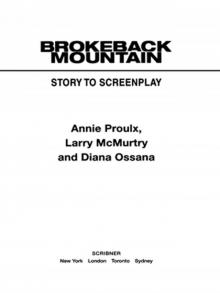 Brokeback Mountain
Brokeback Mountain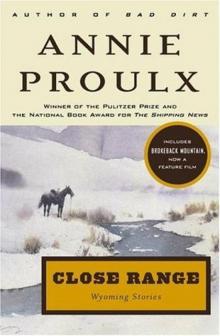 Close Range
Close Range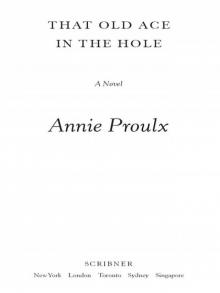 That Old Ace in the Hole
That Old Ace in the Hole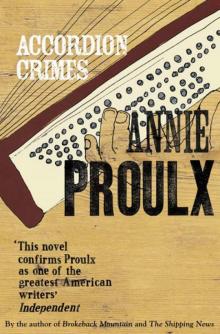 Accordion Crimes
Accordion Crimes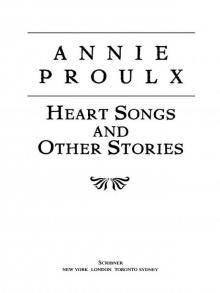 Heart Songs and Other Stories
Heart Songs and Other Stories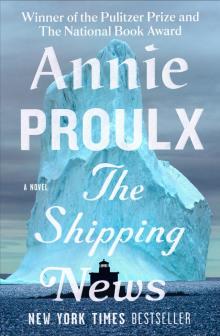 The Shipping News
The Shipping News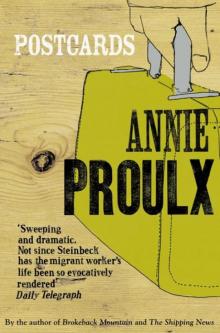 Postcards
Postcards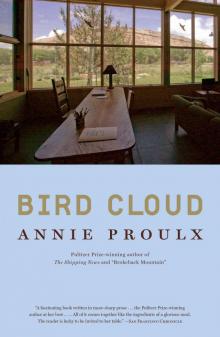 Bird Cloud
Bird Cloud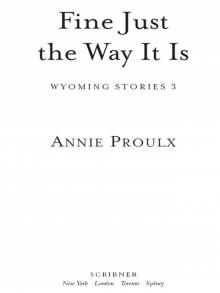 Fine Just the Way It Is
Fine Just the Way It Is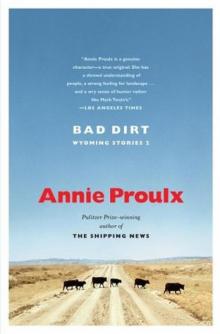 Bad Dirt
Bad Dirt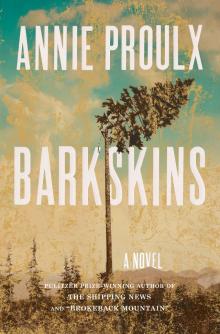 Barkskins
Barkskins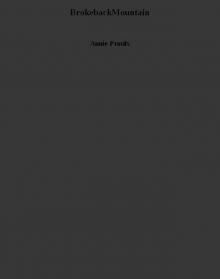 BrokebackMountain
BrokebackMountain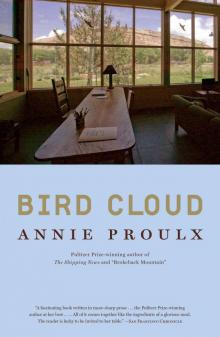 Bird Cloud: A Memoir of Place
Bird Cloud: A Memoir of Place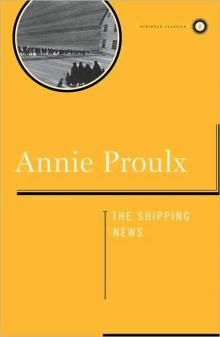 Shipping News_A Novel
Shipping News_A Novel